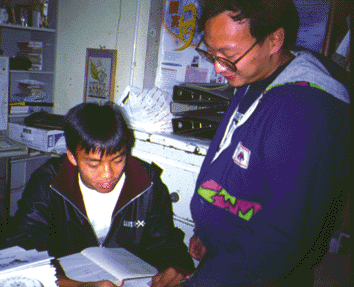Back to schoolEx-drug addicts learn with faithBy Annie Yeung Inside a 2-room stone house on Lantau Island are several young basketball lovers studying English vocabulary. They once were drug addicts. Now they are receiving a 2-year formal education and vocational training at Christian Zheng Sheng College. They were sent to the college by probation officers under legal procedures. The alternative was a 6-month prison term.
Photos by Annie YeungAccording to the principal, Mr. Chan Siu Cheuk, Christian Zheng Sheng College is the first school in Southeast Asia specially designed for young ex-drug addicts. Currently, there are 34 students in the college, of whom 30 are male. The curriculum covers basically nine subjects — Chinese, English, mathematics, accounting, typing, computing, music, sports and Bible studies. Poon Ka Kuen, 20, a former drug abuser and delinquent, entered the school 22 months ago. At first bored by life at the college, he once opened all the water taps and flooded the place. But now cluttering his desk are books like Microsoft Word 6.0, Mastering Excel on the IBMPC, and The Bible. He sat for the Hong Kong Certificate of Education Examination in 1997, receiving Ds in both Chinese and English, and an E in mathematics.
The school also helped two students to obtain distinctions in the London Chamber of Commerce Examination. Another student, Chan Chi Ha, came first in the 1996 Hong Kong Kumon Mathematics Competition, Secondary 2 section. The principal of the college attributes their progress to the inspiration of Christianity, as well as the cultural atmosphere on campus. To accommodate the varied standards of students, a “self-paced programmed learning” and “target-oriented teaching” have been adopted. Flexibility is demonstrated by “hand-in-hand” teaching, a combination of teaching and counselling in which teachers play multiple roles. It aims to show students a more realistic and complete picture of life. The teaching methods require intensive attention, thus exacerbate the problems of a strained budget. The government’s grants for the school are based on a 10-to-1 student-teacher ratio. The annual $1.2 million grant is, according to Mr. Chan, “far from enough”. The teachers not only get lower salaries than those of other schools, but single teachers are required to stay at the school four nights a week, while the married ones must stay at least three nights. Nevertheless, they still consider their sacrifices worthwhile.
Full-time teacher Fiona Cheung Pui Han said, “I enjoy the intimate relationship with students. “I don’t feel like a teacher. My role is to study and to live with them.” This opinion is shared by Ms Fok Kai Nin, who is a part-time teacher of piano and Bible study. She loves her job despite the six hours of travel from her home in Yuen Long. “I have witnessed these young people change and improve. “The satisfaction cannot be measured by money.” The establishment of a school solely for former drug abusers has been criticised for labelling the students as drug addicts that may make them hard to re-enter the society. Yet Christian Zheng Sheng College does not hide the fact that the students were once drug addicts. School supervisor Jacob Lam Hay Sing said, “We encourage them to confront their problems positively. “The school has given them the identity of a student. “They enjoy the status equal to other students.” The basketball team plays matches with other schools. Said Mr. Lam: “After the matches, our students share their experiences with students of other schools, warning them of the dangers of drugs with their own living examples.” Former drug abusers still have a rugged road ahead because not everybody in society is willing to accept them. A restaurant manager said she would not consider hiring former drug addicts. “I’m afraid they may stick to their old habits again,” said the manager. ““No one could guarantee that they won’t.” The Hong Kong Council of Social Service provides employment services to different people, including ex-drug addicts and methadone patients. From 1 April 1996 to 31 March 1997, there were 16 placements out of 47 intakes, for a placement rate of 34 percent. The job positions are mostly janitors, general labourers, couriers and trainees. Ms Leung Mei Heung of The Society For The Aid and Rehabilitation of Drug Abusers said, “We give advice for ex-addicts who look for jobs that suit their abilities and education levels. “But we encourage them to take initiative when looking for jobs.” To gain independence from drugs is just the first step. |


